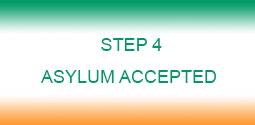The Refugee guide
Step 3 - The decision
After the interview, the Federal office needs to make its decision. Its decisions are based on the personal interview and documents provided by the applicant. It is important to note that the asylum act (Asylgesetz) provides for four forms of protection. The Federal office makes its decision based on this act. A rejection is granted when none of the four means of protections apply. These means of protection are:
- Art 16 a Basic Law (Acknowledgement of entitlement) - The authorities believe you would be subject to a serious human rights violation should you return to your country of origin for fear of you being persecuted on political grounds because of your race1, nationality, political opinion, fundamental religious conviction or membership of a particular social group.
- Section 3 Asylum act (Award of refugee protection) - Just like case 1 above, but in addition you might be persecuted by non-state players.
- Section 4 Asylum act (Award of subsidiary protection) - The authorities believe you are at risk of serious harm in your country of origin and that your country of origin cannot protect you against the threat or you do not believe your country can protect you against that threat - Such might be the case for example when a civil war exits in the country, serious individual threat to life.
- Section 60 V and VII Residence act (Imposition of ban on deportation) - If the authorities believe they will be breaching the European Convention for the Protection of Human Rights and Fundamental Freedoms if you are deported. You can also not be deported if there is a deportation ban for your country of origin.
That said, we can summarize the following:
- Final decision of the Federal Office, after the conclusion of the asylum proceedings, is followed either by a right of residence or a by right to remain, or by an obligation to depart. These immigration authorities are responsible for matters related to termination of residence respectively.
- As described in step 2, once their asylum application has been filed, applicants receive a certificate of their permission to reside (Aufenthaltsgestattung) and this certificate replaces the "proof of arrival". It serves as documentation that they are asylum applicants, and also proves that they are in Germany legally.
- Persons with positive prospects to remain may initially only remain in the area designated in their permission to reside. They too need permission if they would like to temporarily leave this area. The residence obligation may in some cases cease to apply after three months. After the expiry, the areas of residence are then expanded to cover the entire country.
- People with negative prospects, such as individuals from "safe countries of origin", are obliged to live in the reception facilities until the decision is taken. If their asylum application is turned down as or "inadmissible", this then applies until they leave the country and they are not permitted to work during this period and are allowed to move outside their vicinity only after permission from the Federal Office.




